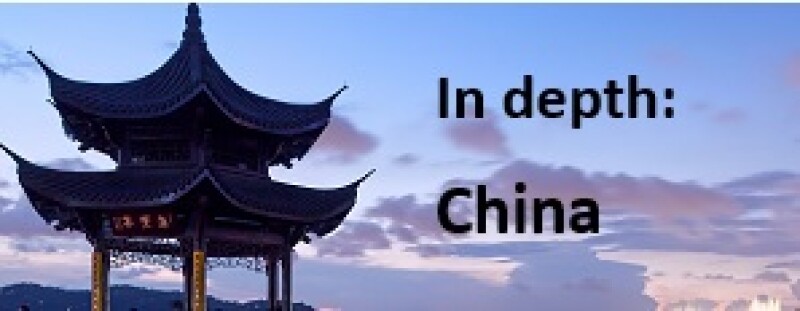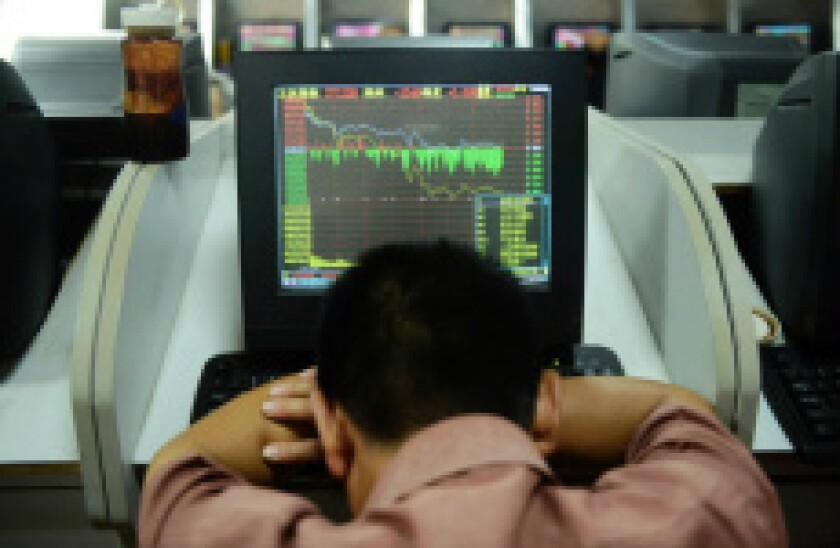It has been a disastrous period for China, as the Shanghai and Shenzhen indices saw dramatic sell-offs in the last three weeks. Since peaking on June 12, the benchmark Shanghai index has lost 32%, while Shenzhen has slumped 40%.
Conditions have been particularly terrifying since Friday last week (July 3), as the markets have closed down sharply every day, with the volatility hitting other Asian markets, including Hong Kong and Japan. This was despite Chinese regulators taking every measure possible to quell the volatility, to no avail.
“A combination of events has continued to impact the recent sharp decline in Chinese equity markets,” said Ben Luk, a global market strategist for JP Morgan Asset Management. “In the A-share market, the sharp fall over the last couple of weeks has been because of the sharp rise before. There was a more than 150% rally, which is pretty sharp when you compare it to the 50% decline now. Is that really that big a deal? Yes, but overall the market is still very up.”

China’s market has had a record-breaking boom in the past year, hitting a seven-year high in mid-June, and surging over a one-year period before the rout began. The frenzy ushered in a wave of new onshore IPOs and fresh equity-raisings, with the enthusiasm even spilling into Hong Kong’s H-share market, which witnessed an uptick in performance and activity.
For instance, in the first quarter alone some 69 companies listed in China, and that number nearly doubled in the next quarter. But investors had been borrowing heavily to buy shares. Subsequent offloading of stock to meet margin calls only exacerbated the crash, creating a vicious circle.
Hong Kong had initially appeared to be less affected by what was happening in China, but eventually it too fell victim to negative sentiment, not just because of the onshore correction but also spooked by the risk-averse environment that the Greek crisis fostered, say market watchers.
Desperate times, desperate measures
As investors hit the panic button, China stepped in to boost confidence with an unprecedented suite of measures. The People’s Bank of China (PBoC) started with an unexpected 25bp interest rate cut on June 27, together with a cut in the reserve requirement ratio — something rarely done simultaneously. Soon after, the China Securities Regulatory Commission (CSRC) loosened up rules for margin trading and made a vow to investigate market manipulation.
But it was its flurry of announcements since July 3 that showed just how frantic it was getting about the equity slump. On Friday, China hiked short selling costs, while deciding to put more liquidity in the market by increasing the capital in one of its lending entities from Rmb24bn ($3.9bn) to Rmb100bn.
On Saturday, 21 securities brokers rallied around the government by agreeing to chip in Rmb120bn to a stabilisation fund, while also promising to buy back shares and hold their investments for the long term. The same day, a group of 25 mutual funds also said they would invest more in the equity market.
“There is an over-reaction and there is a panic attack,” reckoned JP Morgan’s Luk. “Chinese retail investors have been the major drivers of the market in recent months as they see policy support from the central government. But they are less sophisticated, and hefty unwinding of margin positions has propelled the decline even further, which is the reason why markets have gone up and down on a massive scale.”
When China stocks continued to fall this week in defiance of Beijing’s support efforts, the government turned up the heat further. Early in the week, some 30 companies said they would postpone their IPO plans, after which the PBoC announced it would provide liquidity from its own balance sheet if needed.
On Wednesday, when the freefall had still not been contained, China ordered state-owned firms to not cut their stakes in listed companies. Agricultural Bank of China, China Construction Bank, China Citic Bank Corp, China Shipping Container Lines Company, Industrial and Commercial Bank of China (ICBC) and PICC Property and Casualty Company were among the firms that put out filings to the Hong Kong exchange between Wednesday and Thursday to say that their majority owners — other China’s state-owned groups — had undertaken not to reduce their shareholdings.
Authorities are also encouraging brokers to buy back shares, with Haitong Securities announcing a Rmb21.6bn buyback of A and H-shares on July 9, and Citic Securities also planning a deal worth HK$1bn. More than 200 businesses are understood to have pledged to buy back stock. On top of that, more than 1,000 companies have halted trading on mainland exchanges, with investors looking to sell shares finding themselves locked out of around 50% of the market.
Bubble burst
Commentators have differing opinions about the spate of measures put forward by China this week, especially in light of the fact that the market largely shrugged off its attempt to prop up equities.
“Most measures make a lot of sense but the fact that there have been so many and they are not working creates a lot of worry among market participants,” said Karine Hirn, a partner and head of the Asia team of East Capital Group, an emerging and frontier market asset manager. “The fact, however, that the regulator has allowed so many companies to halt trading is not a good thing at all.
“In time of heightened liquidity and anxious sentiment, this has led to a contagion effect on other stocks that are tradeable.”
Philippe Waechter, chief economist at Natixis Asset Management, reckons that what is key at this stage is that the bubble has burst. According to him, the upward movement since the end of 2014 was not sustainable and is reflected in the recent fall. “In this type of environment it is complicated and usually useless to try to control the market. Maybe it is not necessary because there is a need to let the adjustment go.”
On Wednesday evening, China’s securities regulator banned investors with more than a 5% stake in companies from selling shares, including even senior executives and board members of listed companies in the restriction.
By the close on Thursday, there was finally a glimmer of hope, with things looking more positive as GlobalCapital Asia went to press. The Hang Seng Index closed up by 3.73%, while the Shanghai and Shenzhen indices had also recovered, ending the day higher by 5.76% and 3.76%, respectively.
Dented pipeline
But the China storm has impacted many issuers — even those not raising equity in the country or Hong Kong. Canada’s Manulife, which was planning to list a real estate investment trust in Singapore, pulled its IPO at the last minute citing global volatility. Hanjin Transportation, which was looking to exit from Korean Air Lines via a block on Wednesday night, also fell victim to unpredictable markets and cancelled its sell-down. Haixia Capital, meanwhile, managed to exit from Haitong Securities this week, but made a roughly 29% loss in the process. (See separate stories.)
The pipeline for Hong Kong too is now in danger. Sources close to the IPOs of China Railway Signal & Communications Corp and the spin-off of China Communications Construction Company’s dredging arm said they were now in discussions with the issuers about an appropriate timing for the deals. Both are likely to hit the market later than originally planned.
Listings of brokerage houses are also in jeopardy, especially as some of the latest to float in Hong Kong plunged to incredibly low levels on their debuts. Deals for financial firms including China Merchant Securities, CICC and Everbright Securities are on the cards for this year, but sources said the chances of any of them making a move anytime soon was slim.
The second half volumes for mainland IPOs are also expected to be lacklustre, given the rout.
“[The pipeline] has already been affected,” added East Capital’s Hirn. “More specifically we really hope that once the dust settles the regulator will spend time reviewing IPO rules in China as they have been a liquidity drain in the market.”
Hope amid gloom
Many market watchers are looking for silver linings amid the market upheaval. Natixis’s Waechter said China should now think long term and work on strengthening its economy by reducing the country's national debt, and by creating social institutions to boost consumption.
Hirn, meanwhile, is hoping the extent of this month’s panic serves as a “precious lesson” for a more rational approach by China in the future.
“Lots of the initiatives that have been announced by the government are addressing the need for long-term capital to stabilise the market and supporting the SOE reform process,” she said. “The regulator has certainly understood the urgent need to control and limit excessive risk-taking such as margin financing, but here we still wait for stricter rules to be implemented.”
Sources say however that a blow to China in the future could come from index provider MSCI, which in June delayed including A-shares in its indices. The massive correction could further hamper their chances to be a part of the index.
On top of that, the extent of the government’s involvement in bringing the market back on track has left many foreign investors flabbergasted. In particular, China’s move to stop more than 1,000 companies from trading, and stopping shareholders from divesting their holdings, has proved a big surprise.
“Clearly the Chinese government has over-intervened in the market and its decision to ban some major shareholders from selling their A-shares has drawn scepticism and frustration,” said Domingo Chen, chief operating officer of Quantum China Asset Management. “So we believe this time the healing process and investors' confidence might take a while to recover.”
Others are telling their clients to be rational and to keep a close eye on what the Chinese government is doing.
“A couple of years ago, we were telling people to not fight the Fed, and then it was about not fighting the ECB,” said JP Morgan’s Luk. “Last year we were telling them not to fight the BOJ. This year it’s about not fighting the PBOC because they will help support the market, which will be good for investors in the long term.”

